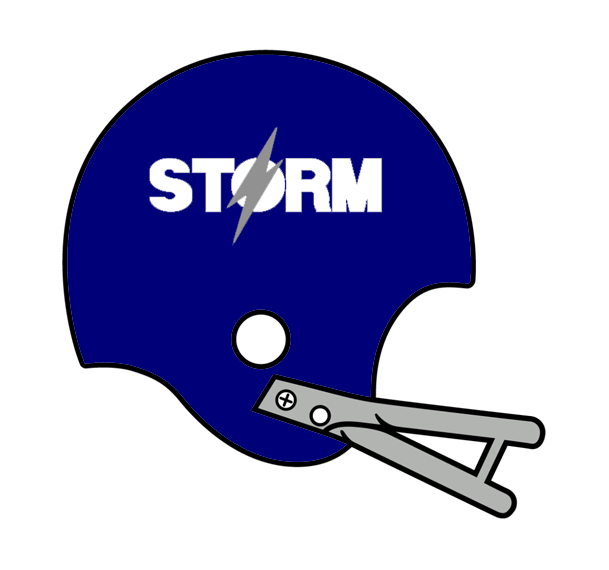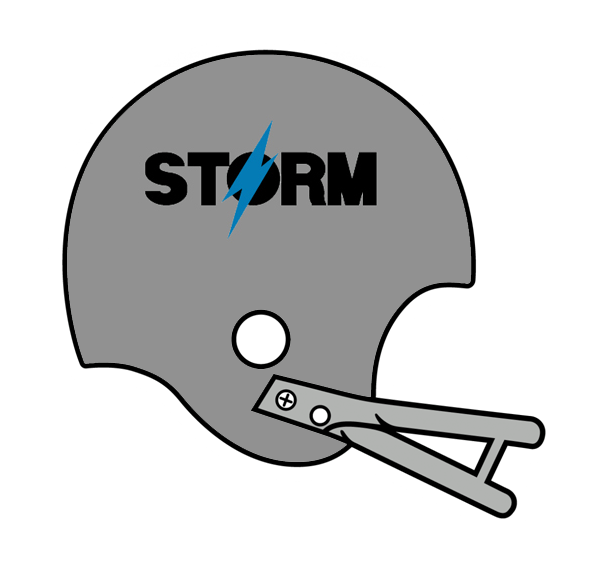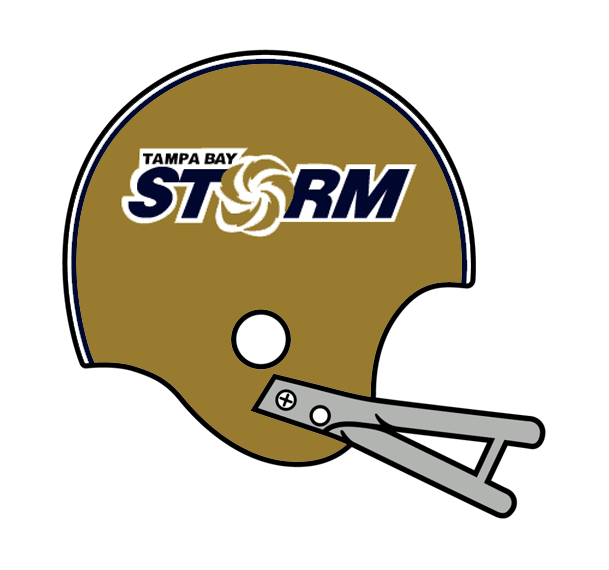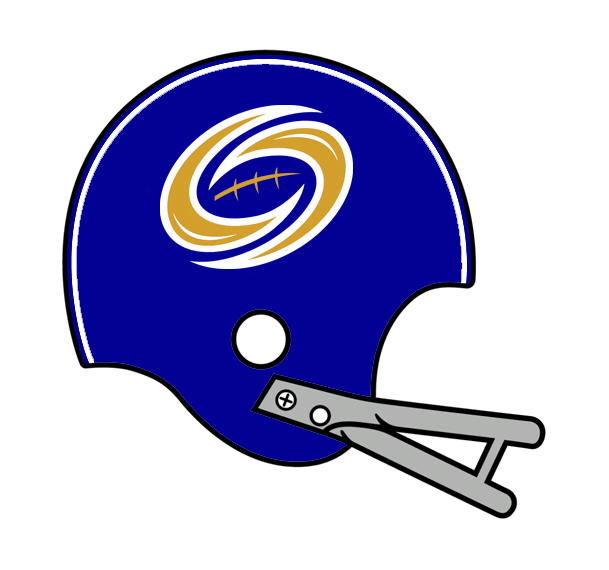



The Tampa Bay Storm is the most successful and longest surviving franchise in AFL history. Teams around the league got a heads-up when the Storm won the Championship in just their first season after moving from Pittsburgh, especially when they beat the Detroit Drive 48-42 in the Motor City. In the 1991 season, the Storm won six games in a row at one point and finished 8-2 en route to the Arena Bowl. The 1992 regular season was actually an improvement over the first year; the Storm went 9-1, their only loss coming to Orlando. After a win over Cincinnati, Orlando would be in the Storm’s eye once again. But like before, the Predators would win, this time a 24-21 overtime thriller. By the end of 1993, it was becoming almost automatic that the Storm would have a great season. They finished 9-3 in the regular season, with several blow out wins. Two of their losses came to Orlando, including a game in Tampa, which drew over 28,000 fans. If the Storm ever had a down year, it would be 1994. After a 7-5 regular season, they would lose to the Massachusetts Minutemen, a one-year team, in the first round of the playoffs 58-51. During the regular season, the Storm had won this match-up, 51-50. In 1994, the Storm would win 9 games in a row at one point, including two playoff games and the Arena Bowl. The Storm beat the Predators in the Arena Bowl game, 48-35, in front of just over 25,000 fans. The following year, the Storm began by winning eight games straight to increase their winning streak to 17, a league best. The streak would be snapped by Charlotte, 66-53. And of course, the season would not be complete without a loss to Orlando. The Storm would win 30-16 over Anaheim and a 55-54 nail-biter over Arizona to advance to the Arena Bowl game. The Storm would be victorious over the Iowa Barnstormers in Arena Bowl X. Following the back-to-back Championship years, the Storm entered somewhat of a lull. The team did not play well enough to earn any home playoff games in 1997 and as a result, lost an overtime thriller at Arizona in the semifinals. It should also be noted that the Storm lost to the Predators in the regular season, 54-30. In 1998, the Storm went 12-2, both losses coming to the Nashville Kats. The team would go all the way to the Arena Bowl, but, you guessed it, the Orlando Predators would have the Storm’s number once more, doubling them up 62-31. This was after the Storm had won both of the regular season meetings with the Preds. Orlando would, once again, end the Storm’s season in 1999, this time by way of a first round 41-19 victory. This was after the Storm beat the Preds 47-28 in the regular season. The Storm still couldn’t beat the Preds in the postseason of 2000, this time losing 34-24 in a quarterfinal. In 2001, the franchise finished at 10-4 for the regular season, two of the losses coming to Orlando. However, the Predators would not end the Storm’s playoff run. The Storm lost their first round game to the Indiana Firebirds, 68-31. 2002 was the first and only losing regular season for the Storm, and the team still managed to make the postseason and even beat Los Angeles before losing at San Jose by a touchdown. After a 12-4 regular season, which included two overtime games, the Predators were ready to succeed once more. This time, the team got past the Predators, 60-50, in a semifinal match to advance to the Arena Bowl where they would beat the Arizona Rattlers, 43-29. In 2004 (a season where the Storm started 3-7 and then won 6 straight) and 2005, the Storm lost first round playoff games to San Jose and Georgia. It should be noted that in many of the years when the Storm lost to Orlando or San Jose in the playoffs, those teams advanced to, or won, the Championship. 2006 brought the worst season in franchise history. The Storm lost four of their last five games and went on a five game road losing streak to miss the playoffs for the first time ever. The team also took their worst loss in franchise history, a 52-13 beating by the rival Predators. The Storm got out to an 0-5 start in 2007 and things looked grim. However, they won nine of their final eleven games, including four straight to end the regular season. The Storm even hosted their first round playoff game, but a 56 yard field goal attempt as time expired went just wide, giving Columbus an upset victory, 56-55. The Predators swept both games against the Storm. The 2008 Storm went 8-8, missing the playoffs by just one game. Six losses came by one score or less. The Storm returned in 2010 in the new AFL, led by QB Brett Dietz. The Storm of 2011 went 7-11, missing the playoffs. The team went 2-6 against playoff bound opponents. Brian Zbydniewski quarterbacked the team for eleven games, passing for 2,825 yards, 56 touchdowns and 15 picks. Opposing quarterbacks were only picked 14 times on the season. The team produced three 1,000 yard receivers in Amarri Jackson, Huey Whittaker, and Hank Edwards. Only five of the team's 91 receiving touchdowns were caught by other than these three. Tampa Bay posted the worst offense in the league's first eighteen game regular season, averaging just 44.6 points per game. The defense did sack opposing quarterbacks 40 times, but the offense converted just 36% on third downs and 38% on fourth downs. In a game at Philadelphia, the Storm scored 25 fourth quarter points, including a 30 yard field goal as time expired to beat the Soul 51-48. However, the Storm scored over 50 points in just six games. The 2012 Storm again missed the playoffs with an 8-10 regular season. Stephen Wasil threw for 3,664 yards, 71 touchdowns and 17 picks. He replaced an injured Nick Hill. Prechae Rodriguez caught 1,653 yards and 32 scores. Amarri Jackson also eclipsed the 1,000 yard mark with 1,012. Chand Williams came up six yards shy of being a third. The team's most trouble came in the second and fourth quarters, in which the team allowed 346 and 345 points respectively. The 2013 Storm season was a tale of two halves. The first half was a 7-4 start, followed by seven consecutive losses to end the regular season. However, the team still managed to qualify for the playoffs. Adrian McPherson and Randy Hippard split most of the season at quarterback. McPherson threw for 3,151 yards, 59 touchdowns and just five interceptions. Hippard threw for 1,310 yards, 24 touchdowns and four picks. McPherson led the league in rushing, with 428 yards and 31 scores. Tampa Bay quarterbacks were sacked a league high 53 times for 216 yards lost. Joe Hills racked up 1,8661 yards and 42 scores on 133 receptions. Two of the teams wins came against playoff opponents in Spokane and Orlando. The Storm would travel to Jacksonville for a first round playoff game and led the top-seeded Sharks 41-20 in the second half. However, the Sharknado would hit and Jacksonville went on a 49-21 run to end the game and win 69-62. Randy Hippeard led the Storm into the 2014 season, throwing for 4,406 yards, 93 touchdowns and 22 interceptions. His top targets were Amarri Jackson and Joe Hills, who both surpassed the 1,000 yard mark. Hills scored 38 times, while Jackson hauled in 21 touchdowns. The team went 3-9 against teams that made the playoffs, despite an 8-10 record. A high note for the Storm was a five game winning streak that preceded losing the final four games of the regular season. Jason Boltus led the 2015 Storm to a 7-11 regular season record, missing the playoffs by a single game. Boltus passed for 5,025 yards, 98 scores and 23 picks. T.T. Tolliver led all receivers with 1,536 yards and 35 touchdowns, while Julius Gregory scored 27 times. It was a 6-6 start to the year, but the Storm dropped five of their last six. The 2016 season marked a new low for the franchise, going 2-15. Much like Portland, the Storm only surpassed 50 points three times. Jason Boltus passed for 2,652 yards, 42 touchdowns and 14 picks. T.T. Toliver led all receivers with 25 scores and 1,578 yards. In 2017, the Storm were quarterbacked by Randy Hippeard. He threw for 3,506 yards, 80 touchdowns and just eight interceptions. Joe Hills caught 129 balls for 1,353 yards and 36 scores, while Kendrick Ings brought in 98 balls for 1,141 yards and 22 scores. Lamark Brown caught fifteen touchdown passes of his own. On defense, the team sacked opposing quarterbacks 30 times and picked off nine balls, returning two for touchdowns. The team went 10-4, dropping all three meetings with Philadelphia and one to Cleveland. The team maintained the second seed in the playoffs and defeated Cleveland at home, 73-59. The Storm advanced to Arena Bowl XXX in Philadelphia, where they would hold a 20-14 halftime lead and led midway through the third quarter. However, Philadelphia was able to build on a 35-27 lead with a safety and hung on for a 44-40 victory.